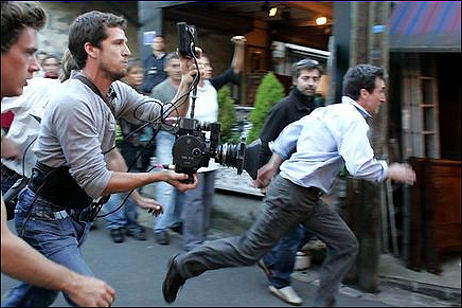So where’s the footage or at least a still of Hitler’s decapitated head? Or at least one of his headless body, slumped over the desk at Madame Tussaud’s of Berlin? A good moralistic story like this happens and there’s no money shot?
wired
Shorter is Better?
This trailer for the currently-playing Gonzo: The Life and Work of Dr. Hunter S. Thompson (HDNet/Magnolia) is so well-cut, smartly condensed and plugged into the Thompson essence that — I need to say this carefully — it’s almost a better thing than the 120-minute doc it’s selling. Almost, I say.
As I wrote last month, Alex Gibney‘s doc tells the full lopsided tale about a brilliant journalist who produced great stuff for maybe 11 or 12 years (mid ’60s to mid ’70s) and then wallowed around in drug-fueled lassitude for almost the next 30. Gonzo is a good film — thorough, inventive, humorous — but it drives you mad with a sadistic ’60s soundtrack made up of songs that classic-rock stations have been torturing their listeners with for the last 30 or 35 years.
The trailer hits every basic point delivered in the film but without the music. Which makes it, in a way, better. At the very least, it gave me an idea of what Gibney’s film might’ve been without having to be swamped with the sounds of Janis Joplin, Jesse Colin Young, et. al.
Sidenote: Time‘s Richard Schickel has written that Gonzo “seems to me a very sad story about an essentially minor figure. Thompson’s was not a life to celebrate (and Gibney, to his credit, does not do so). But there is an implicit approval in this film that makes me uneasy. But then, irrationality always make me uneasy. All artists — and nominally, Thompson was an artist — need a touch of the lunatic about them. But only a touch. In the end they are obliged to produce. And they are obliged not to succumb to, or to excessively encourage, their own myths.”
Worse

Gas station at San Vicente and 26th Street — Saturday, 7.5.08, 4:55 pm. We’ll be at $5 bucks a gallon by Labor Day.
No Bunk
“What I find really hard to take is the way the media behave. They seem to pick on Barack much more readily than they do on McCain. They suddenly say he’s this kind of politician, he’s not what we thought, dah-dah-dah-dah. They say, ‘We’re not supposed to take a side, we’re supposed to just give the news,’ but they don’t just give the news, and they don’t tell the truth…excuse me? I only listen to Keith Olbermann. To hell with the rest of them. I’m an MSNBC type now.” — Lauren Bacall speaking to the S.F. Chronicle‘s Walter Addiego. Somehow the idea of that “put your lips together and blow” lady from To Have and Have Not being a BHO fan feels delightful.
Wrong With That
David Gilmour‘s “The Film Club” is nominally about his decision to permit his 15-year-old son, Jesse, to drop out of school as long as he agreed to watch three movies a week of Gilmour’s choosing. That’s it? No requirement to write about them afterwards? No digesting and reprocessing them in some creative way (like shooting a short-film tribute)? Just watching three films a week doesn’t seem like enough to engage a 15 year-old. I would insist on at least four or five.
Douglas McGrath‘s 7.6 N.Y. Times article about the book reminded me, in any case, of that i-Village article I co-authored with my son Jett about three years ago that covered…well, vaguely similar ground. The title was “Kazan for Recess? Kubrick for Snack? How to create a passion for film in your kids.”
The underlying point, now that I’m thinking about it, was that unless a movie-fanatic father saturates his kids with first-rate films early on (and I mean starting at the toddler stage), any effort to implant or encourage a sense of taste in movies will be an uphill one, and may well prove fruitless.
Kids are off into the wild blue yonder by the time they hit 15. Friends, school, burgeoning sexual urges, media distractions…forget it. The spiritual divorcement process actually begins sometime in their late tweens. You have to reach them early on, when they’re still soft clay, or you’re spinning your wheels. Even if you’ve gotten to them early they still go away in their mid teens. But if you’ve done your work they’ll come back after three or four years.
I love two Gilmour lines that are excerpted in McGrath’s article. The first is a statement that Peter Yates‘ Bullitt “has the authority of stainless steel.” The other, as McGrath writes, “captures the reality-altering magic that movies cast.” After seeing Bullitt as a kid, Gilmour recalls “emerging from the Nortown theater that summer afternoon and thinking that there was something wrong with the sunlight.”
Brooklyn Bus
In response to a somewhat dithering, self-regarding Emily Gould piece called “How Your Emily Gould Sausage Gets Made” (posted 7.3.08 on her Emily Magazine blog), Some Came Running‘s Glenn Kenny wrote the following: “Um, not to put too fine a point on it — and believe me, I know this is going to sound ‘mean,’ but there’s just no way around it — but could you do the rest of humanity the favor of, like, throwing yourself in front of a bus or something? Thanks.”


Glenn Kenny; Emily Gould
I had read elsewhere that Kenny had suggested Gould should off herself, but this is not that. By the use of the term “bus,” which is universally preceded these days by the words “throw under the,” Kenny is telling Gould to dispense with a certain late June/early July attitude or psychology that she’s currently working from, or which (if you want to be forgiving or magnanimous) has enveloped her.
As we all know, those who get thrown under a bus are being punished for something they’ve recently said or done — discipline, not execution. What Kenny is actually suggesting, I think, is that Gould should change or refine or alter or somehow upgrade her…whatever, Brooklyn blogger shpiel. (Not that I have any such issues with Gould myself. I’ve always liked her prose and considered her a pretty cute kitty.)
The proof is in the pudding of Kenny’s actual sentence. The word “like” and the words “or something” are obviously softeners (as in fabric) which emphasize a meaning that is 90% metaphorical.
Jezebel Sez
Last night I was watching clips of a couple of Jezebel writers, Tracie Egan (brunette, teetering towards a certain fullness of face) and Moe Tkacik (redhead, thinner), on Lizz Winstead‘s Shoot the Messenger, a weekly talk show. Their appearance was taped on 6.30.08. If you haven’t spoken to any sharp, urban twentysomething femme fatales lately, you may want to watch this.
Mostly I was going, “Okay…” Sassy but not classy, and certainly not very curious about anything outside their realm. Is there anything more attractive than the exhibiting of genuine curiosity? Is there a bigger turn-off than people who don’t seem to know the meaning of the word? Although I admire their sexual fearlessness, or the pose of same.
Egan and Tkacik are obviously tickled to be passing along intentionally nervy and contrarian attitudes about sex, date rape and sloppy contraception (i.e., having the guy pull out). Clearly they’re being themselves, but that also means deriving a certain delight in pissing off older women who are veterans of feminist battles over the last 30 to 40 years by talking about how…well, listen to them.
Definitely fascinating, although a voice is telling me there’s something degraded going on as well. Something in their “you know, whatever” way of talking — blase urban Valspeak — tells me that certain aspects of the universe are being overlooked by these two. I’d be willing to bet they’ve never read anything by Alan Watts.
Lauren Lipton‘s 5.4.08 N.Y. Times profile of the Jezebel crew reads as follows:
“The Jezebel blog was founded last spring by Gawker Media as a smart, feisty antidote to traditional women’s magazines (or ‘glossy insecurity factories,’ as Jezebel describes them). It quickly developed a loyal following and has seen an influx of new visitors, after being name-checked on the official blog for Gossip Girl, the prime-time soap opera.

Jezebel.com staffers as of two months ago (l. to r.): Tracie Egan, Maria-Mercedes Lara, Moe Tkacik, Jennifer Gerson, Anna Holmes, Dodai Stewart and Jessica Grose.
“But as Jezebel‘s first anniversary approaches on May 21, its readers and editors are learning a lesson right out of high school: popularity has its pitfalls, and mean-girl behavior is hard to quash.
“Some readers, in comments on the site, have accused editors of political bias and misogyny. Readers have called one another, by turns, immature, boring and cliquish. This spring the editors responded by banishing certain commenters and putting others ‘on notice’ for being nasty or, worse, not funny.”
I know the name of that tune. Nothing gives me a feeling of greater pleasure than the banning of brutish big-mouths who spew personal venom on the HE threads. I slap those bitches down like dogs, and then boot their ass into the snow.
How do you pronounce Moe Tkacik’s last name? Obviously you drop the “t.” What is it…Kassik?
Yeah…So?
I shrugged at this Harvey Weinstein–Joe Roth “please fire me” tape, which made its way around earlier this week. This is how colorful swagger types whose success partly depends on their ability to convince people every day that they fear nothing and no one….this is how guys like that talk. The bluster and the clubby attitude and vague air of entitlement. Most of them swear like sailors, and it’s kinda funny when they do.
I don’t live in these realms on a daily basis but time and again I’ve been in the room when such conversations have taken place. Twas ever thus.
Mudville Blues
It pains me to report this, but Hancock did a lot better yesterday than anyone was expecting — $18.8 million — and is now looking at $67 million for the weekend and $109 million cume for the five-and-a-half day July 4th holiday. It’s still not a major wowser — if Hancock was an earthquake-level hit it would be looking at a five-day haul of at least $120 or $130 million — but the $109 million cume means, as my numbers guy said this morning, “they got out alive.”
Dammit. I wanted to see Will Smith, Akiva Goldsman and Peter Berg punished (i.e., by seeing Hancock come up short in terms of expectations) for creating one of the all-time worst third acts in motion picture history.
Yesterday’s reporting about Thursday’s figures being flat encouraged me to think, “Okay, people are actually saying no to a bad film…the ticket-buying public is showing a little judgment here!” Not true, it turns out. Smith is such a big star that people will pay to see anything he’s starring in, including a film that sends you out staggering and gagging. They’re going for those first two acts, I suppose.
Who am I to talk, right? I paid to see it last Tuesday night.
Modifier
I don’t know what Barack Obama is doing now except making clear that he’s not a movement leader or a left-wing ideologue, but a crafty politician trying to appeal to the shmoes as well as the faithful who’ve been with him since ’07. He’s basically a liberal-minded centrist. He doesn’t seem to believe he knows everything or is absolutely right all the time. He seems to respect the idea of looking at things anew once in a while, to see how things may have changed or shifted around. That said, he’d better not overdo this move-to-the-center thing or he’ll piss off the lefties and then the press will start beating him up.
French Improvement
In his review of Guillame Canet‘s Tell No One, a superb French thriller that I finally saw this afternoon, New Yorker critic David Denby writes that he “realized I was very happy that everyone was speaking French. The reason is simple: an American version of this material would have had too many explosions and far too much violence in general, and it would have been similar to 30 other thrillers made here during the past ten years.”

Tell No One director Guillame Canet (left, holding steadi…excuse me, a mojocam) shooting chase chase sequence with Francois Cluzet (right).
Truer words have rarely been spoken. It’s not that Tell No One, which involves murder, thugs, cops, gangstas, shootings, chases and the like, lacks thrills and intrigue. But it doesn’t brandish the cloddish brute machismo that you have to accept with if you’re going to watch a thriller made in this country.
American crime pics are about their stories and characters, sure, but they’re also about topping the last successful thriller in terms of visceral impact or stylistic panache. Their producers don’t want 15 year-old kids telling each other, “The shoot-out scene in that movie last month was a lot cooler.”
Tell No One is aimed at viewers who’ve had a year or two of college, read a book occasionally and have made it past the grand old age of 25. It plays its own game and sets its own standards. A little quieter, a lot smarter and much more riveting than…now I’m trying to think of a recent American murder-mystery I’ve really liked. It’s been a while.
Tell No One is based on an American mystery novel by Harlan Coben, but director Guillaume Canet, working with the screenwriter Philippe Lefebvre, “has set Coben’s material in a realistic social and working world where good-looking, intelligent, and articulate people find one another interesting,” as Denby notes. “La belle France! This emphasis on sociability is not unusual in French commercial filmmaking, but it’s virtually unknown in genre movies made here these days. There is violence — some of it startling, all of it significant — but that’s not what the movie is about.”
It’s also interesting as hell because the lead actor, Francois Cluzet, is almost a dead ringer for Dustin Hoffman, or rather Hoffman as he looked around the time of Rain Man, Family Business and Dick Tracy. It’s like watching Hoffman’s twin brother since he has a similar acting style, keeping the tension tucked inside but always radiating intelligence and paying close attention, etc.
It’s doubly fascinating that Canet puts Cluzet through a terrific foot-chase sequence in Paris, since it recalls the nocturnal running-through-Manhattan scene that a bare-chested Hoffman performed in Marathon Man.
Metropolis More
Five years ago Paramount Home Video put out a DVD of the “authorized restored version” of Fritz Lang‘s Metropolis, and everyone was happy. Here, finally, was the version film buffs could buy and take to bed. “At last we have the movie every would-be cinematic visionary has been trying to make since 1927,” said N.Y. Times critic A.O. Scott.

No longer. A near complete version of the film has been found in Argentina after a quarter of the film was believed lost for 80 years, a German film foundation announced two days ago. The extra footage runs an extra 25 minutes, and the 2003 DVD runs 124 minutes, so this new and presumably final version of Metropolis will presumably run 149 minutes, or just shy of two and a half hours. This is excellent new, of course, but I’ve seen Metropolis twice and I’ve never felt the absence of any vital narrative thread. I’m not a Lang scholar so what do I know?
